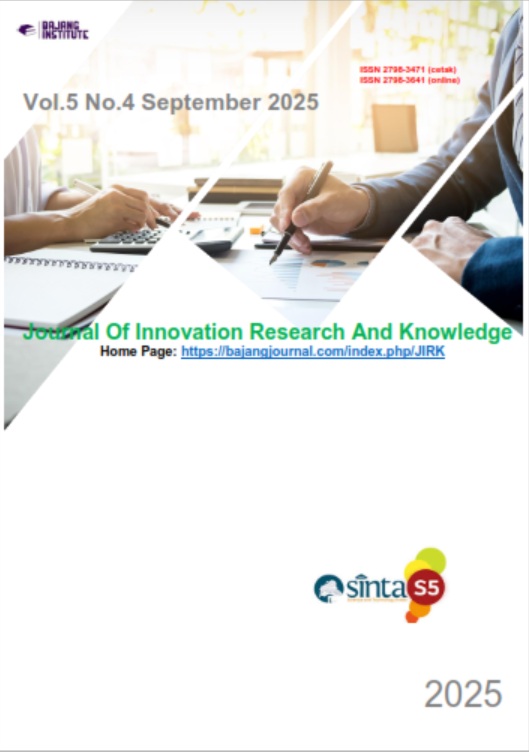PERLINDUNGAN HUKUM TERHADAP ANAK ANGKAT YANG MENERIMA WASIAT TERKAIT SENGKETA PARA AHLI WARIS MENURUT HUKUM PERDATA
DOI:
https://doi.org/10.53625/jirk.v5i4.11240Keywords:
Adopted Children, Wills, HeirsAbstract
Abstract : When someone dies, the inheritance process arises, and is regulated by inheritance law, inheritance law functions to regulate the transfer of a deceased person's assets to the heirs. Heirs according to the Civil Code are divided into two, namely, heirs ab intestato and testamenteir. Heirs ab intestato refer to blood and marriage relations, while heirs testamenteir refer to a person's will and can be shown to others outside of blood relations, including heirs testamenteir who are adopted children. Inheritance to adopted children through testament refers to Article 954 of the Civil Code. Testament is one of the legal means that ensures adopted children receive a share of inheritance rights from the testator's inheritance legally. The problem in this study is How to Resolve Disputes Against Adopted Children Who Receive Wills Related to Disputes Between Heirs According to Civil Law, and How is Legal Protection for Adopted Children Who Receive Wills Related to Disputes Between Heirs According to Civil Law. In this study, the researcher used the Legal Protection theory according to Satjipto Rahardjo and the Dispute Resolution Theory according to Dean G. Pruitt.
The research method used in this study is a type of normative legal research, namely legal research with literature studies based on primary, secondary and tertiary legal sources. The research approaches used are the Legislation Approach, Conceptual Approach, Analytical Approach and Case Approach. The technique of collecting legal materials is carried out by identifying and inventorying positive legal rules, book literature, journals and other sources of legal materials. For the legal material analysis technique, it is carried out with grammatical interpretation, Systematic interpretation, Analogy Construction and legal refinement construction.
The results of the study concluded that adopted children who were legally adopted through a court decision, and had no blood or marital relations, even though they did not receive a will from the testator, adopted children still had the same inheritance rights as legitimate children, legally adopted children became part of the heirs, ab intestato. Legal protection provides protection for human rights that are harmed by others and this protection is given to the community so that they can enjoy all the rights granted by law. The dispute between the adopted child and the heir was resolved by the problem solving, method through mediation, but no agreement was found, so the dispute was resolved by the contending method through the courts in order to maintain the inheritance rights of the adopted child.
References
Ahmad Rafiq, Hukum Perdata Di Indonesia Edisi Revisi, Rajawali Pers, 2015, Jakarta.
Bowers, The Psychological Impact of Adoption on Children, journal of Child Psychology, Vol. 45, No. 3, 2018.
Dean G Pruitt, Negotiation in Social Conflict 3rd ed, Mc Graw Hill, New York, 2004.
Dean G Pruitt, Negotiation in Social Conflict 3rd ed, Mc Graw Hill, New York, 2004
Dean G Pruitt, Negotiation in Social Conflict 3rd ed, Mc Graw Hill, New York, 2004.
Halim, Hukum Keluarga Teori dan Praktik di Indonesia, Prenada Media, Jakarta.
Hasbi Ash-Shiddieqy, Hukum Keluarga, Bulan Bintang, Jakarta, 1994.
Mardani, Hukum Waris di Indonesia Teori dan Praktik, Sinar Grafika, Jakarta, 2020.
Prodjodikoro Wirjono, Hukum Perkawinan di Indonesia, Intermasa, Jakarta, 2015.
Prodjodikoro Wirjono, Hukum Perkawinan di Indonesia, Intermasa, Jakarta, 2015.
Satjipto Rahardjo, Ilmu Hukum, PT Citra Aditya Bakti, Bandung, 2000.
Soepomo, Hukum Adat di Indonesia, Pradnya Paramita, Jakarta, 1986.
Soerjono Soekanto, Pokok-Pokok Sosiologi Hukum, Rajawali Pers, Jakarta, 1992.
Sudargo Gautama, Pengangkatan Anak dalam Hukum Indonesia, Alumni, Bandung, 1993.
Suharso, Hukum Keluarga dan Perlindungan Anak, Rajawali Pers, Jakarta, 2019.
Perundang-undangan
Undang-Undang Dasar Negara Republik Indonesia Tahun 1945 beserta Amandemennya.
Kitab Undang-Undang Hukum Perdata.
Undang-Undang Nomor 1 Tahun 1974 tentang Perkawinan.
Undang-Undang Nomor 16 Tahun 2019 tentang Perubahan Atas Undang-Undang Nomor 1 Tahun 1974 tentang Perkawinan.
Undang-Undang Nomor 23 Tahun 2002 tentang Perlindungan Anak.
Undang-Undang Nomor 35 Tahun 2014 tentang Perubahan Atas Undang-Undang Nomor 23 Tahun 2002 tentang Perlindungan Anak.
Undang-undang Nomor 30 Tahun 1999 tentang Arbitrase dan Alternatif Penyelesaian Sengketa.
Peraturan Pemerintah Nomor 54 tahun 2007 tentang Pelaksanaan Pengangkatan Anak.
Surat Edaran Mahkamah Agung Nomor 2 Tahun 2009 Tentang Kewajiban Melengkapi Permohonan Pengangkatan Anak Dengan Akta Kelahiran.
Surat Edaran Mahkamah Agung Nomor 3 tahun 2005 Tentang Pengangkatan Anak.
Surat Edaran Mahkamah Agung Nomor 6 Tahun 1983 tentang Penyempurnaan Surat Edaran Nomor 2 tahun 1979.
Yurisprudensi
Putusan Mahkamah Agung Nomor: 2830 K/Pdt/2015 jo Putusan Pengadilan Tinggi Semarang Nomor: 109/Pdt/2015/PT. SMG jo Putusan Pengadilan Negeri Surakarta Nomor: 97/Pdt.G/2014/PN. Skt.
Putusan Mahkamah Agung Nomor: 1463 K/Pdt/2010 jo Putusan Pengadilan Tinggi Semarang Nomor: 295/PDT/2009/PT. SMG jo Putusan Pengadilan Negeri Surakarta Nomor: 41/Pdt.G/2008/PN. Jpr.
Putusan Mahkamah Agung Nomor: 2169 K/Pdt/2008 jo Putusan Pengadilan Tinggi Surabaya Nomor: 319/Pdt/2007/PT. Sby jo Putusan Pengadilan Negeri Nganjuk Nomor: 31/Pdt.G/1987/PN. Ngjk.













